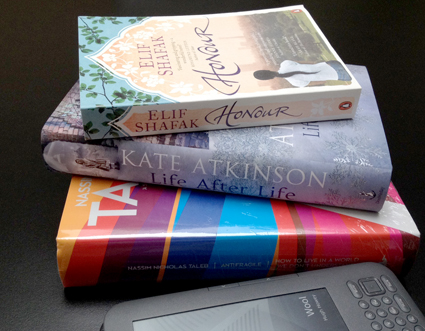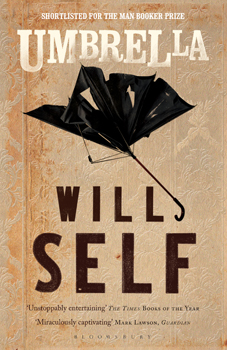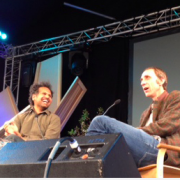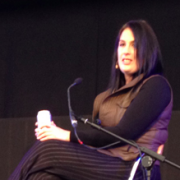Hay Festival #5: 6 Commonwealth Writers on Writing
‘Kamila Shamsie has placed Pakistani literature on the world stage,’ said Razia Iqbal introducing a Commonwealth Writers’ panel on the second weekend of Hay Festival. Kamila Shamsie’s most recent novel Burnt Shadows takes the reader across the globe from Nagasaki in 1945, through Partition in India and on to 9/11 in New York, and Afghanistan. (Shortlisted for the Orange Prize for Fiction).

A standout event at Hay Festival: left to right, Razia Iqbal talks with Kamila Shamsie, Michelle de Kretser and Monique Roffey. In association with Commonwealth Writers.
‘I didn’t know what I was doing,’ said Shamsie. ‘I was moving away from things I knew, the neighbourhoods where I grew up.’ Before starting this novel she’d assumed she would only ever write about Karachi. However, she approached Burnt Shadows in the same way she approached any fiction project. ‘The first questions are: What year is it? What month? What’s happening? What’s the political temperature?’
Shamsie appeared alongside Sri Lankan writer Michelle de Kretser and Trinidadian writer Monique Roffey to discuss Making Sense of Place: Using Fiction to Tell The Real Story.
Iqbal asked the three writers if they felt they had a responsibility to counter outside perceptions of their countries. Roffey responded, ‘The Caribbean suffers from stereotyping – palm trees and paradise. So the writer has to dig deep.’ And de Kretser said, ‘I have friends who visit Sri Lanka and have a marvellous time. They say, “So the war’s over and everything’s all right.” It’s certainly not all right but none of it seems to impinge on them. When I travel I have that happy, glib response, too, to the countries I travel through.’
Shamsie highlighted the difference between fiction and non-fiction is this regard. ‘As a writer I have to start with the idea that I’m writing for someone who knows some of what I’m talking about. Fiction has a different sort of intimacy to non-fiction. I’m not trying to explain but trying the understand something; it’s about I need to enter this world.’ She praised John Hersey’s non-fiction account Hiroshima. ‘There are certain things reportage can do. Fiction has to be very deeply touching.’
And on the issue of colonial history, de Kretser said, ‘History intruded on our lives so we can’t write fiction that ignores that history.’ And Roffey: ‘History impacts on your characters unless you keep them indoors!’
In her current writing project, Roffey has focused on the attempted coup d’état in Trinidad in 1990 and specifically on an urban myth that emerged from that event. The insurgents were prosecuted but gained amnesty. A myth developed among sections of the community that the insurgents should have been executed when arrested. ‘I said ‘Let’s say they were shot. How would you feel then?” I decided in my current book to have the possibility of that story coming true.’ (Sounds a great starting point to me).
On the writing process, de Kretser said, ‘I always know the ending. It gives me a feeling of security, that I know where I’m heading.’ Roffey: ‘I live with an idea for a year, testing it. But then the organic thing happens.’ And Shamsie on the subject matter for Burnt Shadows, ‘I saw a photograph of a woman in Nagasaki who had three bird-shaped burns on her back.’ At the time of the bomb, this woman had been wearing a white kimono with a black pattern of birds, which became ‘tattoos’ on her skin. ‘I knew it then: There will be a novel, there will be this woman and I need her to turn around so I can see her.’
This was a standout event for me at Hay Festival. And the ticket only cost £5. The next event, also from Commonwealth Writers, was free.
Writers on Writing – Commonwealth Prizes
Lisa O’Donnell received the Commonwealth Book Prize for the best first novel of 2012, The Death of Bees. The prize was presented by John le Carré, no less!
O’Donnell was born in Scotland and now lives in Los Angeles. She won the Orange Screenwriting Prize in 2000.
So what prompted her to write The Death of Bees? Answer: ‘I wrote the first few lines of a screenplay and I looked at them for a long time. I decided to turn it into a novel.’
Canadian writer Eliza Robertson and Trinidadian Sharon Millar were jointly awarded the Commonwealth Short Story Prize. According to Robertson, who wrote We Walked on Water, ‘I’m certainly a short story writer and I read more short stories than novels. I like to play with form and the short story encourages experimentation.’
And Sharon Millar who wrote The Whale House: ‘Almost everything I write is about place. If I don’t, then the note is off. I have started a novel but I’m not sure if a novel can have the same luminosity as a short story.’
Indeed author DW Wilson, one of the judges, commented that the short story seemed easier because ‘it’s a smaller object.’ But he cautioned, ‘If you have one clunker sentence in a short story it becomes very apparent, very quickly.’ (Indeed it does).
For my next, possibly last, Writers on Writing blogpost I’ll cover a brilliant event on the last day of Hay that introduced NoViolet Bulawayo and Meike Ziervogel.













Leave a Reply
Want to join the discussion?Feel free to contribute!